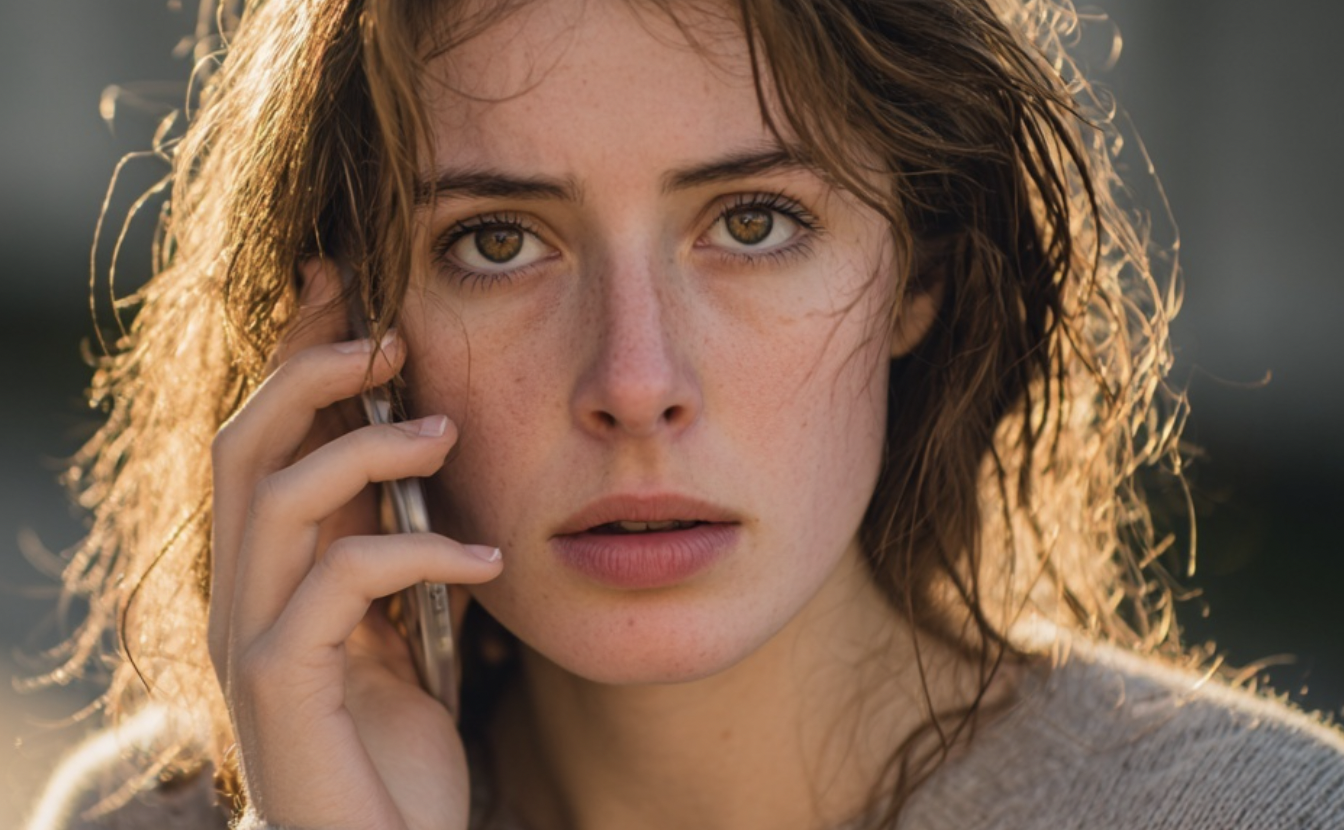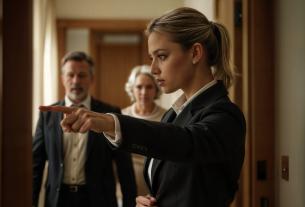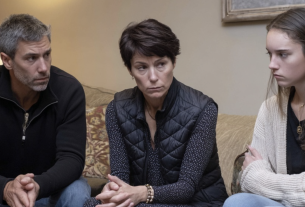Natasha hurried home, wrapping herself tighter in her long, warm scarf. Autumn this year was unusually raw: one day a fine drizzle hung in the air, another the wind blew so hard the trees bent, and today it all came down at once. Natasha was coming back from the institute. Her bag dragged on her shoulder, her fingers were freezing even inside her gloves, the cold cut right through her, and all she dreamed of was one thing: to get home as soon as possible, warm up with a cup of hot tea, and leaf through her new book.
The street was almost empty. Trying to skirt the puddles so as not to dirty her shoes, Natasha turned into the courtyard, beyond which she could already see the entrance to her building, and suddenly stopped: very close by, from a dark corner, came a quiet, barely audible sobbing. Natasha froze, listening intently: there was no one in sight, but the sound came again—soft, timid little hiccups.
“Hey… who’s there?” she called cautiously, surprised herself at how muffled her voice sounded.
There was no answer, but something moved behind a rusty iron climbing frame. Natasha took a step forward, her heart beating faster. She bent down carefully and made out, in the darkness, a little boy. Skinny, no older than five. He was hunched up, trembling all over—no doubt from the cold, and from fear too.
“Don’t be afraid,” Natasha said gently, holding out her hand. “I won’t hurt you. What are you doing here alone, in the dark?”
The boy sniffled and wiped his tears with his palm. He hesitated for a few seconds, as if deciding whether to trust a stranger, and finally cautiously crawled out of his hiding place.
His jacket was thin, the buttons almost undone, his boots muddy, soaked through from the puddles.
“I… Vitya…” he said quietly. “Mama… a car hit my mama… They took her somewhere… And I… got scared… and ran away.”
Natasha’s heart clenched. Such a small, fragile child, alone in the cold autumn evening. She could hardly hold back her tears, trying not to show how shaken she was by the sight.
“Come with me, Vitenka…” she said, crouching so she’d be at his eye level. “You’re frozen and hungry. You’ll warm up at home, and then we’ll decide what to do next.”
She thought of calling the police right away, but looking into his frightened eyes and at his wet cheeks she realized: no, first she had to make him feel safe—feed him, warm him, calm him down.
They walked quickly, almost running. Vitya clung to her hand, so light and delicate it felt like she could lift him with one arm, and her heart ached with pity.
The apartment smelled of borscht, fried onions, and fresh homemade bread—the kind her father always managed to bake when Natasha stayed late studying. Natasha breathed in deeply, sensing the cold and damp of the street gradually falling away.
She and her father, Igor Vitalyevich, had lived alone since she turned ten. Her mother, Yulia, had decided to devote her life to her career and moved abroad for good. Since then their contact had been limited to rare video calls: her mother would talk about her work, Natasha about school and the institute. All the household responsibilities fell on her father’s shoulders, and he managed them with dignity: the apartment sparkled with cleanliness, there was always a hot dinner on the stove, and Natasha never felt deprived of anything.
“Where have you been, Natash?” came his warm, slightly tired voice from the kitchen the moment the door slammed.
“Dad, I…” she began, but a man in a soft home sweater was already in the hallway. He stopped, looking from his daughter to the boy whose hand she was holding.
“Who… is this?” he asked quietly, as if the words were hard to get out.
“Dad, this is Vitya,” Natasha explained quickly. “I found him in the courtyard. He was alone. A car hit his mother… He got scared and ran… I couldn’t just leave him there…”
Igor Vitalyevich slowly took off his glasses, as if they were keeping him from seeing. His face went pale, but he didn’t say a word, only nodded, as though in agreement.
In the kitchen, Natasha sat Vitya on a stool. He clutched the spoon in his little fist, his eyes still darting around warily. But soon hunger won out—he began to eat, hastily and greedily.
Natasha stroked his head, soothing him softly:
“Don’t hurry, it’s all yours, no one will take it away.”
Igor Vitalyevich stood by the window, turned slightly as if watching the rain on the glass, though his gaze kept returning to the child. He seemed to want to say something but couldn’t bring himself to, merely sighing heavily. Natasha understood: her father was probably worrying, thinking about what to do next, how to find the boy’s relatives.
When Vitya finally finished eating, Natasha took him to her room. The boy crawled under the blanket, buried his nose in the pillow, and almost immediately fell asleep. Tear tracks still gleamed on his cheeks, but his breathing had grown even and calm. Natasha stood over him for a moment, straightened the blanket, and her heart filled with an unexpected, almost maternal tenderness.
“Poor thing…” she whispered. “How frightened you must have been…”
She closed the door quietly and went into the living room. There, in the armchair by the window, sat her father. He was pale, his shoulders slightly slumped, his hands gripping the armrests, his gaze fixed on the floor as if the answers to everything were hidden there.
“Dad?” Natasha called softly. “What’s wrong? You look like you’ve seen a ghost…”
He raised his eyes slowly, and Natasha suddenly felt uneasy. The usual gentleness, the calm light she knew so well, were gone from his look. There was confusion and pain there—and something else: a hidden anxiety, some secret he couldn’t bring himself to voice.
“It’s fine,” he rasped, trying to recover his normal tone. But she could see that nothing was “fine.”
“Dad…” Natasha came closer and sat on the edge of the armchair. “I can tell something’s wrong. Please, tell me.”
Igor Vitalyevich was silent for a long time. It seemed as if every word stuck in his throat. He sighed heavily several times, ran a hand over his face as if trying to banish memories. But in the end he spoke, quietly, in measured tones:
“You think you’re my only child, don’t you, Natasha?” he said, shifting his gaze to his daughter. In his eyes flickered a shadow of pain she had never seen there before.
“Well… of course, the only one. Isn’t that so?” Natasha asked, surprised.
The answer came so unexpectedly it was like a jolt of electricity through her:
“No, my dear… you’re not my only one. I had a son, Matvey.”
“A son?” she repeated, unable to believe it. “But… why did I never know about him?”
Igor Vitalyevich sighed heavily again and began his story:
“It was all a long time ago, before I met your mother. I was married to a woman named Nadezhda. We lived simply but happily. When our son turned three, I was coming back from a business trip by train… and that’s when I met Yulia—we were in the same compartment.”
Natasha listened, holding her breath, feeling as if time around her had slowed.
“She… it was as if she bewitched me, you understand?” her father went on. “We started seeing each other. We went to the movies, to restaurants, to the theater. She knew how to talk, how to look at you, so that the ground vanished from under your feet. I— a grown man—lost my head. And then Yulia said it had to be marriage or nothing. I didn’t think twice. That very evening I confessed to Nadezhda, filed for divorce, and left for Yulia.”
Tears welled in Natasha’s eyes. She had always thought of her mother as gentle, kind, almost perfect. And now her familiar world was crumbling, revealing a different side.
“We got married,” Igor Vitalyevich continued, “and soon you were born. But Yulia immediately set a condition: no past. She forbade me to even mention Nadezhda and my son.”
“Forbidden?” Natasha breathed. “How can anyone forbid that?!”
“She could,” he said with a bitter smile. “You can’t imagine how she got her way. For a while I still visited Matvey when I could, brought him gifts. But one day Nadezhda said, ‘Don’t come to us anymore. After your visits he cries at night. Don’t toy with his feelings.’ And I left. But I always sent money, regularly.”
Natasha was silent. It felt as if the ground had opened beneath her feet.
“And then Yulia left,” her father said, quieter and quieter, “and I decided to find my son and build a relationship again. But they no longer lived at the old address. Since then I haven’t known anything about them.”
He fell silent, as if placing a period at the end.
“How could this happen?!” Natasha jumped up, tears rolling down her cheeks. “You let Mom forbid you from seeing your son? Why? Why didn’t you introduce me to him? I always dreamed of having a brother!”
“I’m sorry, my dear,” her father said quietly. “Back then I thought I was doing the right thing. I thought I’d give you and Yulia a happy life… And it turned out how it turned out…”
Silence settled over the room; only the soft ticking of the wall clock could be heard. At last Natasha asked:
“But why did you tell me this now?”
Igor Vitalyevich lifted his eyes sharply; his voice trembled:
“You see… Vitya… he looks like Matvey. Like two peas in a pod. Just the way I remember him.”
Silence fell again. Natasha was overflowing with mixed feelings; she didn’t know how to react: her father had hidden part of his life, her mother was not who she thought she was; and somewhere there was a brother she had never known existed.
“What do we do now?” she whispered, looking toward the door of the room where Vitya slept.
“Do what’s right,” her father replied. “The boy needs to be returned to his family. But first we need to find out who they are.”
Natasha nodded. Her heart ached. But alongside the pain a new feeling appeared—resolve. They couldn’t change the past, but they still had the present. And in it was this boy, whom they could help.
First, Natasha dialed the city hospital. As the line rang, she felt her anxiety growing with every second: her fingers trembled and her thoughts scattered like leaves in the autumn wind.
Finally a sleepy nurse picked up:
“Yes, they brought in a woman hit by a car today,” she confirmed. “She’s in intensive care now. Concussion and bruises, but her life isn’t in danger. She’ll recover.”
At those words, it was as if a stone fell from Natasha’s heart. She exhaled in relief:
“Thank you so much,” she said and hung up, repeating to herself, “Thank God… nothing serious.”
The next task was calling police stations—to check whether anyone was looking for the boy.
At the first station she reached, the answer was brief: no, no one had filed such a report. But during the second call the duty officer perked up:
“Yes, we have a report of a missing child,” he said. “A boy named Vitya, yes. Where is he now?”
Natasha gave the address, hung up, and took a deep breath.
“They’re on their way,” she told her father. “His mother is in the hospital, but it’s nothing critical. His relatives are coming for him.”
Igor Vitalyevich only nodded, trying to keep his emotions in check.
Not even an hour had passed when the doorbell rang. Natasha rushed to open it and saw a woman of about fifty and a young man on the threshold. The woman stepped forward first.
“You… you’re the one who found Vitenka?”
“Yes,” Natasha nodded, stepping aside. “He’s in my room, asleep.”
The woman stepped into the apartment and immediately, as if her legs gave out, sank onto the little bench in the hallway. The man put an arm around her shoulders, but he too was strung tight—you could see they’d spent the evening in hell.
“I’m Nadezhda,” the woman finally introduced herself, wiping away tears. “This is my son, Matvey,” she nodded toward the man. “And Vitenka is my grandson.”
Natasha gasped; her father’s words echoed in her ears.
“I… I’m Natasha,” was all she could say.
At that moment Igor Vitalyevich came out of the room. He was about to say something, but the words stuck in his throat.
Nadezhda looked at him and gasped so loudly that Natasha even flinched.
“My God…” she breathed. “Igor…”
He took a step toward her, then stopped short. Matvey, standing beside her, stared at him in bewilderment.
“Mom, who is this?” he asked.
“Your father,” Nadezhda said quietly.
What followed were conversations—disjointed, anxious, full of feelings that had been building in their chests for years.
Igor asked for forgiveness, recalled everything he hadn’t had time to say, told them he had never forgotten his son for a single day, that every moment his heart had been full of thoughts of Matvey.
Natasha sat nearby and watched the old walls crumble and new bridges rise between people right before her eyes. Her heart was overflowing with powerful emotions: shock, relief, joy.
Nadezhda turned out to be an amazingly kind and open woman. She thanked Natasha at length for not walking past her grandson, smiling with a warmth that went straight to the heart:
“Thank you, dear.”
And Natasha felt that she liked this woman. She wasn’t an enemy, not a rival to her mother, but a wise, warm, understanding grandmother and mother who knew how to forgive and love.
Meeting her brother was easy—and even cheerful. Matvey smiled at her, shook her hand a bit awkwardly, and then suddenly hugged her tight.
“So you’re my sister,” he said, joy in his voice. “All these years and I never knew…”
And when Vitya peeked out of the room, still sleepy, hair tousled, Nadezhda and Matvey rushed to him and held him tight. The boy buried his nose in his father’s shoulder and burst into tears.
Everything unfolded in a remarkable way after that. While Matvey’s wife recovered in the hospital, Vitya often stayed with Natasha and Igor. He quickly bonded with his new aunt and grandfather, as if he had always lived there.
Step by step, Igor Vitalyevich tried to mend things with Nadezhda. At first she kept her distance, but gradually the ice melted. A few months later, after listening to all his words, tears, and remorse, Nadezhda said:
“All right, Igor. Let’s try again from the beginning.”
And so they became husband and wife once more.
The house came alive. Now everyone gathered at the big family table: Natasha; her brother Matvey with his wife; little Vitya; Igor and Nadezhda. Voices and laughter filled the home again, drifting from the kitchen where Natasha and Nadezhda baked pies together, while Vitya tried to peek around the corner and steal a piece. It created a feeling of true family comfort that had been missing for so long.
In time, of course, the news reached Yulia. She immediately called her daughter, her voice cold and sharp:
“Stay away from that lot! Do you hear me, Natasha? They’re not your family. I forbid you to have anything to do with them!”
But Natasha answered firmly:
“No, Mom… They are my real family—unlike you, who left me and went away without a second thought.”
And without waiting for a reply, she hung up.
In the next room Vitya was laughing, bickering with Matvey over some little thing. Igor and Nadezhda were drinking tea in the kitchen, talking quietly. Natasha looked at them and, for the first time in a long while, felt it: here it was—true happiness.



